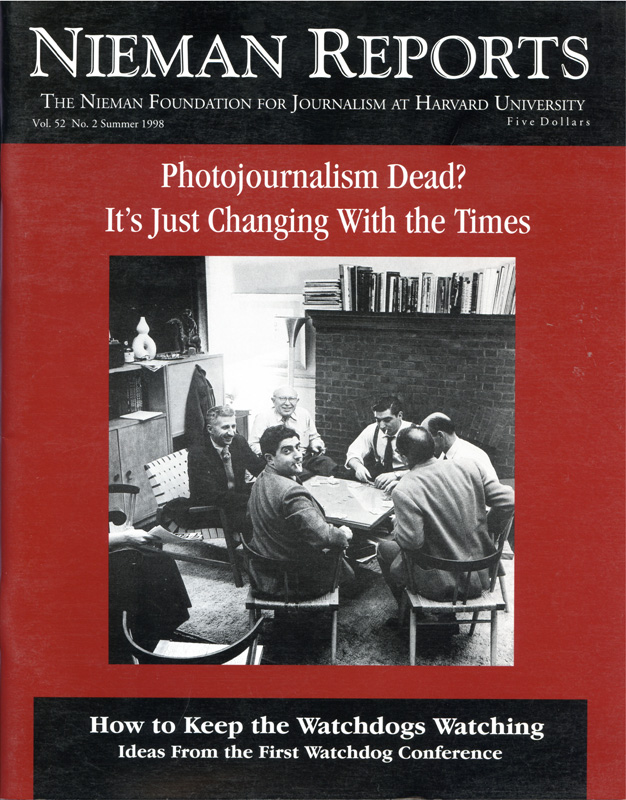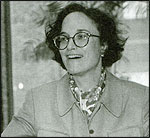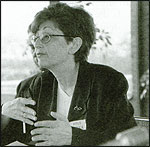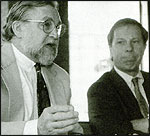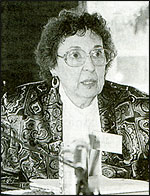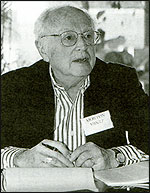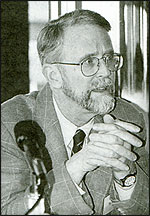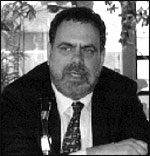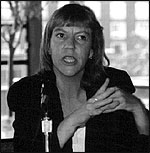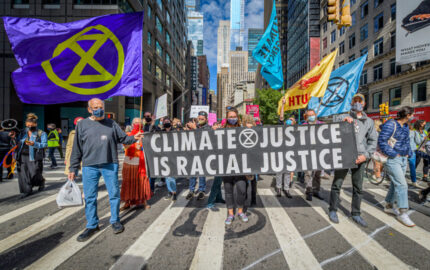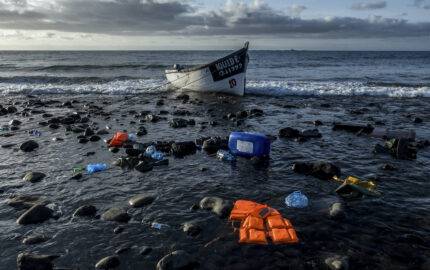Half the world, it seems, is screaming for reporters to be sweeter and more polite, to stop traveling in packs and shouting embarrassing questions at public officials, to purr and play nice—while the other half yells that reporters aren’t tough enough, they ought to be bolder and more aggressive, more passionate in going after the evildoers lurking in public and private institutions.
Can journalists be both pussycats and watchdogs?
That riddle, along with ancillary media issues, lured thoughtful commentators to Harvard on May 2 for a conference on watchdog journalism sponsored by the Nieman Foundation. The conference brought together print and broadcast journalists and academics to discuss the new world of media, a world in which, as Nieman Curator Bill Kovach noted, “a new challenge faces journalism” because “free market capitalism, digital and satellite technology, the potential for global commerce and journalism on the World Wide Web, have all led to massive and dislocating social, political and economic change.”
All that—and journalists still have to keep from having rotten tomatoes and old tin cans flung at their heads by a public fed up with gossip, bad behavior and plain old bad news.
It’s a tough balancing act, to be sure. How can journalists do a better job of reporting on powerful entities, such as governments and corporations, while not contributing to the cynicism about those entities that threatens to erode participation in civic life?
At what point does energetic newsgathering become a “feeding frenzy,” in the phrase made notorious by Larry Sabato’s book of the same name—and at what point, conversely, does an unwillingness to pursue aggressively the stories of possible corruption in high places become an abdication of journalistic responsibility?
The journalists who gathered in Cambridge on that rainy May weekend had different opinions about the problems and solutions, but they shared at least one conviction about watchdog journalism: There ought to be more of it, and what there is, ought to be better.
Easy to say, of course, but arduous to execute, especially in an age in which reporters themselves are under scrutiny by their audiences. Conference participants—divided into panels to discuss the watchdog journalist’s role in international affairs, state and local governments, economics and nonprofit organizations—quickly got down to the difficult business of codifying just how journalists can improve journalism.
For the international affairs panel, the pressing question was relevance: How can reporters make Americans care about international news? How, moreover, can reporters reconcile the skepticism necessary in their relations with government spokespeople with the public’s professed discomfort with that adversarial stance?
Robert Manning, former Editor in Chief of Atlantic Monthly who has covered foreign affairs for news organizations such as Time and Life and worked the other side as a State Department spokesman in the Kennedy Administration, mused:
“Most Americans are not going to be interested in foreign affairs. These are subjects in many cases that not only bore the public, they bore publishers. They bore news directors and network news presidents. They’re not sexy. They’re complicated. And there are other things that are easier to read and more titillating.”
Another problem, noted Philip Taubman, Assistant Editor of the editorial page of The New York Times, is the vastly altered relationship between government representatives and the press:
“My experience as a journalist, which…was formed more by the Vietnam experience than the World War II experience, is that the government is deceptive, and that that is a core component of American foreign policy. And they do not want to provide accurate and truthful information to the press…. So from my vantage point, the way to deal with this is to continue to be as aggressive as you can…. I’m not particularly concerned that the American people find the press too aggressive…. If we get intimidated by that, we cease to do our job.
“The essence, in many ways, of national security reporting is to keep pushing and to keep insisting on information and to keep being obnoxious about it and to put up with a fair degree of static from the public.”
Former New York Times Executive Editor Max Frankel agreed:
“Information, after all, is a commodity, and it is power. It is the government’s intention to use it, to withhold it, to abuse it. It is our job to ferret it out…. The real problem as I see it is that too few journalistic organizations are, in fact, committed to…quality journalism.”
Carla Robbins, diplomatic correspondent for The Wall Street Journal, believes that the public actually has more interest in international issues than it is routinely given credit for: “I find Americans more aware of the effect that foreign policy has on their life, in the sense of what they buy at the Wal-Mart and where things are made or how their jobs may be affected by it…. I think that there is an intrinsic generosity and an intrinsic internationalism is still in the American public…. I think Americans basically get it.”
Participants advised journalists to dig for ways to make international news urgent and relevant in a post-Cold War era that has rendered obsolete the traditional frame into which reporters neatly inserted stories and issues: who’s ahead, who’s behind, the anti-Communist scorekeeping paradigm that was, as Robbins said, “almost like a football game.” That need not always mean a financial frame, a what’s-in-it-for-me mentality applied to every international event; it can also mean, as Frankel reminded the panel, presenting the problems and concerns of other nations the same way that journalists report on the issues facing Americans. Among these problems might be aging populations, education and crime.
Perhaps, some panelists suggested, newspapers should give up trying to make every reader care about international news. While “elitism” is a dirty word in these egalitarian times, maybe journalists should clean it up a bit: just as some readers don’t care about sports or business, some may not care about international news. Instead of endlessly simplifying their work to catch as broad an audience as possible, foreign correspondents might be better served by acknowledging that what they write about is not for everybody.
The panel assigned to discuss the watchdog role of journalists covering state and local issues agreed that such a role is crucial if serious journalism is to distinguish itself from other media.
Joyce Purnick, Metropolitan Editor of The New York Times, declared that watchdog journalism “is our mandate. It is ultimately what the press should be doing…. If we don’t put things in perspective, if we don’t go underneath the news, I’m not exactly sure who will.”
Purnick put it in Sisyphean terms: “Is there enough watchdog journalism, enough aggressive journalism, enough investigative journalism? The answer is…no, there’s never enough…. There can never be enough.”
In place of the generalist of old, today’s reporter must specialize, Purnick argued. “The news is getting so much more sophisticated…. You need people who understand science. You need people who understand health care. You need people who understand economics.”
Indeed, the expertise required by watchdog journalism is what will save the profession, said Newsday Editor Anthony Marro. “I think watchdog journalism is not just what we do. It’s who we are…. We have to keep doing things that show up the important distinctions and differences between us and a lot of things that provide the information…. Watchdog journalism at every level is what sets us apart.”
Marro refused to accept the notion that a serious, thorough story will automatically alienate readers. “The great, great bulk of the essential work of government at state and local levels is things that affect people’s lives. So that’s inherently interesting.”
The panelists agreed that journalists need to be more than stenographers, mindlessly recording the speeches of public officials. Reporters should check statistics that officials toss out so casually, should interview the people affected by bureaucratic and legislative decisions. Reporters need to stay on beats longer, developing expertise on subjects and familiarity with major players; editors, too, need to educate themselves on the specifics of beats, so that they can ask the crucial, hole-plugging questions about stories.
On the economics panel, veteran journalists Eileen Shanahan and Morton Mintz insisted that anyone seeking to improve coverage of economic issues must first determine who or what is impeding that improvement: those who own the presses, or those who provide the copy? If the answer is the former, then how can journalists coerce their bosses—who are themselves rich and powerful—to cover the rich and powerful with greater thoroughness and regularity?
“What most editors are pushing is soft news,” declared Shanahan, former New York Times reporter. “I think that’s what’s killing newspapers. We aren’t giving [readers] the hard news and the strong features that are related to real societal problems that I believe people want to read.”
Mintz, an investigative journalist for The Washington Post, concurred: “The founding fathers of this country believed that power had to be checked and balanced, and in the First Amendment, they were saying [it had to be] monitored, audited. That’s our mission.”
David Warsh, business columnist for The Boston Globe, said that economics reporting differs from other kinds of watchdog journalism because a great deal of the information on which it is based—audited financial statements of companies, for instance—is regularly available. In a compelling metaphor, he perceived the watchdog function of journalism as only one among many responsibilities:
“[Think of] news as analogous to music, and the print press as analogous to a symphony, and it’s easier to talk about what I meant. You have a lot of different voices in a symphony, a lot of different instruments doing a lot of different things.
“Watchdog journalism…is one element in a fairly complicated mix of voices that we package together and sell to advertisers and the public. What I think is special to watchdog journalism is that it’s analogous to improvisation in many ways. The best watchdog journalism is like a riff that begins with a solitary reporter…. If it’s well done, it gets picked up, and before very long, you’ve got three or four voices playing it, and if you’ve really done your job well, before very long, you’ve got the whole symphony improvising on a set of themes that were initially introduced by one hard-working reporter someplace.”
Once again, expertise was the watchword emphasized by panelists. Unless reporters have been able to build, day by day, a rapport with their beats, those journalists won’t be able to identify—much less report on—the large issues looming over their fields. Journalists, moreover, should be aware of the many links between businesses and individuals today, the so-called “synergy” that creates alliances hidden to the public. And media organizations in general should recognize that good watchdog reporting occurs not in fits and spurts but over the long haul. As Warsh noted, a lifetime of careful, diligent reporting might be required to “bring certain reconnaissances to fruition.”
The panelists discussing the watchdog function as applied to nonprofit organizations conceded that some journalism elicits a negative public reaction when it targets beloved charitable institutions. Such stories are the journalistic equivalent of indicting somebody’s mom: sure, she might be a crook, but sometimes you just don’t want to know about it.
“The thing that fascinated me about nonprofits…was how many of them there are and how diverse their missions are,” said George Rodrigue, a Washington reporter for The Dallas Morning News. “They’re all over the place. They’re growing rapidly in resources and money…. They’re also getting increasingly businesslike, and they’re exercising influence in everything from congressional elections to neighborhood development in cities, yet we don’t pay them that much attention.
“Are we doing a good job of monitoring nonprofits? Hell, no.”
Janet Wilson of The Los Angeles Times observed that journalists, by temperament, are reluctant to tackle charitable organizations whose work may seem to reflect the very ideals that reporters hold. “Journalists…are crusaders, as corny as that sounds. We want to save the world…. This plays out in a lot of ways in newsrooms and prevents more comprehensive coverage of what is really a burgeoning, increasingly influential sector of our economy.”
Many publishers and editors serve on the boards of charitable organizations, Wilson noted, which can render problematic a tough, inquisitive stance toward those organizations.
Rodrigue and his colleagues advised journalists to regard nonprofits as windows on their communities; through them, reporters can get a sense of a city’s social problems, as well as identify the power base, representatives of which usually are associated with local nonprofits. Moreover, nonprofits are large employers; reporters should treat them as such, not as untouchable citadels of goodness. And as nonprofits increasingly move into the political sphere—buying ads for candidates with untaxed dollars—journalists need to apply greater scrutiny to the organizations’ agendas and ideologies.
After the panelists had had their say, Murrey Marder, retired Diplomatic Correspondent for The Washington Post and the conference’s guiding spirit, offered a blunt challenge: “The toughest part is what comes next.”
Manifestoes are marvelous, goals are elusive, but the value of the watchdog conference will unfold for journalists and their organizations over the months and years ahead.
As Kovach pointed out, power wears a new face these days, and it maintains a different address. No longer is it confined to familiar entities such as governments and corporate boardrooms. For journalists, these changes demand that they find where power resides, watch those who wield it, and report regularly on abuses and shortcomings, no matter how disillusioning the results. For in the long run, quality journalism, no matter what it turns up, evokes the opposite of disillusionment.
Everybody knows that power corrupts. The idea is permanently suspended in the aspic of aphorism; even shorn of its loyal sidecar (“absolute power corrupts absolutely”), the phrase resonates with familiarity, so much so that people rarely examine it anymore.
Yet as the watchdog conferees explored, power corrupts more than merely those who possess it. When it courses unseen and unchecked through the tunnels that undergird our lives, power corrupts something else as well: the optimism of those in thrall to it. Power corrupts both the powerful and the powerless. To the powerful, it brings arrogance; to the powerless, despair. Both emotions distort and corrode a free society.
The journalist must serve as, in effect, the biographer of power, discovering the secrets of its birth, tracing its growth, revealing its influence. Where power is, that is where the watchdog journalist should go as well, with a careful eye and a busy pencil.
 Julia Keller, television critic of The Columbus Dispatch, is a 1998 Nieman Fellow.
Julia Keller, television critic of The Columbus Dispatch, is a 1998 Nieman Fellow.
Can journalists be both pussycats and watchdogs?
That riddle, along with ancillary media issues, lured thoughtful commentators to Harvard on May 2 for a conference on watchdog journalism sponsored by the Nieman Foundation. The conference brought together print and broadcast journalists and academics to discuss the new world of media, a world in which, as Nieman Curator Bill Kovach noted, “a new challenge faces journalism” because “free market capitalism, digital and satellite technology, the potential for global commerce and journalism on the World Wide Web, have all led to massive and dislocating social, political and economic change.”
All that—and journalists still have to keep from having rotten tomatoes and old tin cans flung at their heads by a public fed up with gossip, bad behavior and plain old bad news.
It’s a tough balancing act, to be sure. How can journalists do a better job of reporting on powerful entities, such as governments and corporations, while not contributing to the cynicism about those entities that threatens to erode participation in civic life?
At what point does energetic newsgathering become a “feeding frenzy,” in the phrase made notorious by Larry Sabato’s book of the same name—and at what point, conversely, does an unwillingness to pursue aggressively the stories of possible corruption in high places become an abdication of journalistic responsibility?
The journalists who gathered in Cambridge on that rainy May weekend had different opinions about the problems and solutions, but they shared at least one conviction about watchdog journalism: There ought to be more of it, and what there is, ought to be better.
Easy to say, of course, but arduous to execute, especially in an age in which reporters themselves are under scrutiny by their audiences. Conference participants—divided into panels to discuss the watchdog journalist’s role in international affairs, state and local governments, economics and nonprofit organizations—quickly got down to the difficult business of codifying just how journalists can improve journalism.
For the international affairs panel, the pressing question was relevance: How can reporters make Americans care about international news? How, moreover, can reporters reconcile the skepticism necessary in their relations with government spokespeople with the public’s professed discomfort with that adversarial stance?
Robert Manning, former Editor in Chief of Atlantic Monthly who has covered foreign affairs for news organizations such as Time and Life and worked the other side as a State Department spokesman in the Kennedy Administration, mused:
“Most Americans are not going to be interested in foreign affairs. These are subjects in many cases that not only bore the public, they bore publishers. They bore news directors and network news presidents. They’re not sexy. They’re complicated. And there are other things that are easier to read and more titillating.”
Another problem, noted Philip Taubman, Assistant Editor of the editorial page of The New York Times, is the vastly altered relationship between government representatives and the press:
“My experience as a journalist, which…was formed more by the Vietnam experience than the World War II experience, is that the government is deceptive, and that that is a core component of American foreign policy. And they do not want to provide accurate and truthful information to the press…. So from my vantage point, the way to deal with this is to continue to be as aggressive as you can…. I’m not particularly concerned that the American people find the press too aggressive…. If we get intimidated by that, we cease to do our job.
“The essence, in many ways, of national security reporting is to keep pushing and to keep insisting on information and to keep being obnoxious about it and to put up with a fair degree of static from the public.”
Former New York Times Executive Editor Max Frankel agreed:
“Information, after all, is a commodity, and it is power. It is the government’s intention to use it, to withhold it, to abuse it. It is our job to ferret it out…. The real problem as I see it is that too few journalistic organizations are, in fact, committed to…quality journalism.”
Carla Robbins, diplomatic correspondent for The Wall Street Journal, believes that the public actually has more interest in international issues than it is routinely given credit for: “I find Americans more aware of the effect that foreign policy has on their life, in the sense of what they buy at the Wal-Mart and where things are made or how their jobs may be affected by it…. I think that there is an intrinsic generosity and an intrinsic internationalism is still in the American public…. I think Americans basically get it.”
Participants advised journalists to dig for ways to make international news urgent and relevant in a post-Cold War era that has rendered obsolete the traditional frame into which reporters neatly inserted stories and issues: who’s ahead, who’s behind, the anti-Communist scorekeeping paradigm that was, as Robbins said, “almost like a football game.” That need not always mean a financial frame, a what’s-in-it-for-me mentality applied to every international event; it can also mean, as Frankel reminded the panel, presenting the problems and concerns of other nations the same way that journalists report on the issues facing Americans. Among these problems might be aging populations, education and crime.
Perhaps, some panelists suggested, newspapers should give up trying to make every reader care about international news. While “elitism” is a dirty word in these egalitarian times, maybe journalists should clean it up a bit: just as some readers don’t care about sports or business, some may not care about international news. Instead of endlessly simplifying their work to catch as broad an audience as possible, foreign correspondents might be better served by acknowledging that what they write about is not for everybody.
The panel assigned to discuss the watchdog role of journalists covering state and local issues agreed that such a role is crucial if serious journalism is to distinguish itself from other media.
Joyce Purnick, Metropolitan Editor of The New York Times, declared that watchdog journalism “is our mandate. It is ultimately what the press should be doing…. If we don’t put things in perspective, if we don’t go underneath the news, I’m not exactly sure who will.”
Purnick put it in Sisyphean terms: “Is there enough watchdog journalism, enough aggressive journalism, enough investigative journalism? The answer is…no, there’s never enough…. There can never be enough.”
In place of the generalist of old, today’s reporter must specialize, Purnick argued. “The news is getting so much more sophisticated…. You need people who understand science. You need people who understand health care. You need people who understand economics.”
Indeed, the expertise required by watchdog journalism is what will save the profession, said Newsday Editor Anthony Marro. “I think watchdog journalism is not just what we do. It’s who we are…. We have to keep doing things that show up the important distinctions and differences between us and a lot of things that provide the information…. Watchdog journalism at every level is what sets us apart.”
Marro refused to accept the notion that a serious, thorough story will automatically alienate readers. “The great, great bulk of the essential work of government at state and local levels is things that affect people’s lives. So that’s inherently interesting.”
The panelists agreed that journalists need to be more than stenographers, mindlessly recording the speeches of public officials. Reporters should check statistics that officials toss out so casually, should interview the people affected by bureaucratic and legislative decisions. Reporters need to stay on beats longer, developing expertise on subjects and familiarity with major players; editors, too, need to educate themselves on the specifics of beats, so that they can ask the crucial, hole-plugging questions about stories.
On the economics panel, veteran journalists Eileen Shanahan and Morton Mintz insisted that anyone seeking to improve coverage of economic issues must first determine who or what is impeding that improvement: those who own the presses, or those who provide the copy? If the answer is the former, then how can journalists coerce their bosses—who are themselves rich and powerful—to cover the rich and powerful with greater thoroughness and regularity?
“What most editors are pushing is soft news,” declared Shanahan, former New York Times reporter. “I think that’s what’s killing newspapers. We aren’t giving [readers] the hard news and the strong features that are related to real societal problems that I believe people want to read.”
Mintz, an investigative journalist for The Washington Post, concurred: “The founding fathers of this country believed that power had to be checked and balanced, and in the First Amendment, they were saying [it had to be] monitored, audited. That’s our mission.”
David Warsh, business columnist for The Boston Globe, said that economics reporting differs from other kinds of watchdog journalism because a great deal of the information on which it is based—audited financial statements of companies, for instance—is regularly available. In a compelling metaphor, he perceived the watchdog function of journalism as only one among many responsibilities:
“[Think of] news as analogous to music, and the print press as analogous to a symphony, and it’s easier to talk about what I meant. You have a lot of different voices in a symphony, a lot of different instruments doing a lot of different things.
“Watchdog journalism…is one element in a fairly complicated mix of voices that we package together and sell to advertisers and the public. What I think is special to watchdog journalism is that it’s analogous to improvisation in many ways. The best watchdog journalism is like a riff that begins with a solitary reporter…. If it’s well done, it gets picked up, and before very long, you’ve got three or four voices playing it, and if you’ve really done your job well, before very long, you’ve got the whole symphony improvising on a set of themes that were initially introduced by one hard-working reporter someplace.”
Once again, expertise was the watchword emphasized by panelists. Unless reporters have been able to build, day by day, a rapport with their beats, those journalists won’t be able to identify—much less report on—the large issues looming over their fields. Journalists, moreover, should be aware of the many links between businesses and individuals today, the so-called “synergy” that creates alliances hidden to the public. And media organizations in general should recognize that good watchdog reporting occurs not in fits and spurts but over the long haul. As Warsh noted, a lifetime of careful, diligent reporting might be required to “bring certain reconnaissances to fruition.”
The panelists discussing the watchdog function as applied to nonprofit organizations conceded that some journalism elicits a negative public reaction when it targets beloved charitable institutions. Such stories are the journalistic equivalent of indicting somebody’s mom: sure, she might be a crook, but sometimes you just don’t want to know about it.
“The thing that fascinated me about nonprofits…was how many of them there are and how diverse their missions are,” said George Rodrigue, a Washington reporter for The Dallas Morning News. “They’re all over the place. They’re growing rapidly in resources and money…. They’re also getting increasingly businesslike, and they’re exercising influence in everything from congressional elections to neighborhood development in cities, yet we don’t pay them that much attention.
“Are we doing a good job of monitoring nonprofits? Hell, no.”
Janet Wilson of The Los Angeles Times observed that journalists, by temperament, are reluctant to tackle charitable organizations whose work may seem to reflect the very ideals that reporters hold. “Journalists…are crusaders, as corny as that sounds. We want to save the world…. This plays out in a lot of ways in newsrooms and prevents more comprehensive coverage of what is really a burgeoning, increasingly influential sector of our economy.”
Many publishers and editors serve on the boards of charitable organizations, Wilson noted, which can render problematic a tough, inquisitive stance toward those organizations.
Rodrigue and his colleagues advised journalists to regard nonprofits as windows on their communities; through them, reporters can get a sense of a city’s social problems, as well as identify the power base, representatives of which usually are associated with local nonprofits. Moreover, nonprofits are large employers; reporters should treat them as such, not as untouchable citadels of goodness. And as nonprofits increasingly move into the political sphere—buying ads for candidates with untaxed dollars—journalists need to apply greater scrutiny to the organizations’ agendas and ideologies.
After the panelists had had their say, Murrey Marder, retired Diplomatic Correspondent for The Washington Post and the conference’s guiding spirit, offered a blunt challenge: “The toughest part is what comes next.”
Manifestoes are marvelous, goals are elusive, but the value of the watchdog conference will unfold for journalists and their organizations over the months and years ahead.
As Kovach pointed out, power wears a new face these days, and it maintains a different address. No longer is it confined to familiar entities such as governments and corporate boardrooms. For journalists, these changes demand that they find where power resides, watch those who wield it, and report regularly on abuses and shortcomings, no matter how disillusioning the results. For in the long run, quality journalism, no matter what it turns up, evokes the opposite of disillusionment.
Everybody knows that power corrupts. The idea is permanently suspended in the aspic of aphorism; even shorn of its loyal sidecar (“absolute power corrupts absolutely”), the phrase resonates with familiarity, so much so that people rarely examine it anymore.
Yet as the watchdog conferees explored, power corrupts more than merely those who possess it. When it courses unseen and unchecked through the tunnels that undergird our lives, power corrupts something else as well: the optimism of those in thrall to it. Power corrupts both the powerful and the powerless. To the powerful, it brings arrogance; to the powerless, despair. Both emotions distort and corrode a free society.
The journalist must serve as, in effect, the biographer of power, discovering the secrets of its birth, tracing its growth, revealing its influence. Where power is, that is where the watchdog journalist should go as well, with a careful eye and a busy pencil.
 Julia Keller, television critic of The Columbus Dispatch, is a 1998 Nieman Fellow.
Julia Keller, television critic of The Columbus Dispatch, is a 1998 Nieman Fellow.
